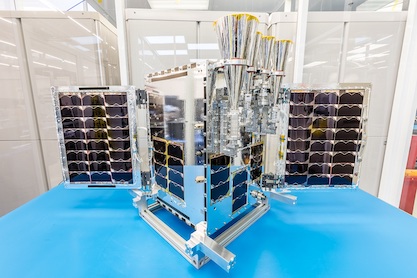Latest News

The Telesat LEO 3 satellite built by SFL. Photo: SFL
Space Flight Laboratory (SFL) has already shipped the recently announced Telesat LEO demonstration satellite, and it will launch on a Rocket Lab mission set for July.
Just last month Telesat announced it ordered a new demonstration satellite called LEO 3 from SFL to replace the Phase 1 LEO demonstration satellite launched in 2018. SFL announced this week that it shipped the satellite, and Rocket Lab shared that it is set for launch on an Electron mission from New Zealand with a launch window that opens on July 14.
SFL said it built the satellite on a “relatively aggressive” schedule. LEO 3 has a mass of 30 kg and is based on SFL’s Defiant microsatellite platform. LEO 3 will provide continuity for Telesat’s customer and ecosystem vendor testing campaigns after the other satellite is decommissioned.
Telesat’s Lightspeed development process has hit several bumps during the past few years. Original plans for the constellation included nearly 300 satellites, but Telesat decreased the size by 100 satellites. The operator is still working to secure the final funding needed to start the program, and Telesat estimates the project won’t start launching until 2026.
The Rocket Lab mission is called “Baby Come Back,” as the launcher will attempt a marine recovery for the booster used in the mission. It is a rideshare launch that will also include four cubesats for NASA’s Starling mission and two 3U satellites for Spire Global’s constellation.
Get the latest Via Satellite news!
Subscribe Now